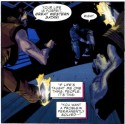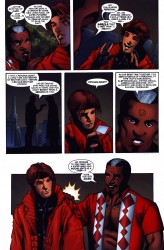On Illmatic, Nas breaks off the intro to N.Y. State of Mind to say, “I don’t know how to start this.” There’s a pause, and with a “yo,” he goes on to kick five minutes of sublime lyrics. It’s not a studio gimmick or a punch-in. It’s real life. This little snippet of time, maybe three seconds at most, is Illmatic in miniature. It’s the biography of the young black male: simultaneously brilliant and unsure, arrogant and nervous, full of potential and lacking at the same time.
It’s a line that brings to mind Loop Hughes of 100 Bullets. Before the events of the series, he was the son of a single mother, running with faceless nobodies, and drifting through life. He had a life, but it was half of one. He was going nowhere.
Eventually, he meets his father, thanks to a nudge from Agent Graves, and that puts him on some kind of a road. He absorbs knowledge and experience from his father like a sponge. After his father dies, he learns that his father was respected a great deal by hard men, and he learns another lesson.
Over the course of the series, Loop pays attention to things and keeps learning. He’s trained in prison by a man with no conscience, and when they get out, he’s connected to more men who knew his father. As time goes on, he learns about life and killing. He’s a sponge.
Finally, toward the end of the series, he’s in a situation that is the ultimate mexican standoff. Two of the men involved have no interest in solving it any way but one. Loop sees another solution and takes it, trusting that things will align as they should. And they do. It’s another Illmatic line. “Whose world is this? The world is yours, the world is yours.”
There’s a lot that I like about Loop, and a lot that I can relate to. I know about having a single mother. I know about being aimless. I know about needing a push to reach greatness. I can identify with Loop’s rise over the course of 100 Bullets, because it resembles my own.
Illmatic’s message is, at least in part, about potential. You are sitting at the top of a hill and full of potential energy. You can either waste that energy and fall, or you can spend it and soar. The thing that I, and a lot of people like me, understand is that the potential within me is limitless. The older I get, the more I realize I can do. Everything I’ve ever decided to do, I’ve done and done well. When someone asks me “Whose world is this?” the only appropriate response is “It’s mine, it’s mine, it’s mine.”
At the same time, that arrogance only goes so far. Sometimes you have to sit back and whisper, “I don’t know how to start this.” You start out on the back foot, so you’ve got to worry about how you look to others and make sure that you’re on point. The moment you screw up, you become a statistic, a stereotype, typical, and generally just another reason for people to go “Ugh, I knew it.” There’s that little voice in the back of your head that says that you aren’t good enough, and never will be.
Once you get past that, the world is yours.
Loop’s been on my mind a lot lately, for both the reasons I mention above and the fact that 100 Bullets is about two weeks away from ending as I type. When I went to New York Comic-con, I had a chance to get a sketch from Eduardo Risso, artist of 100 Bullets. I thought about it for a moment and realized that I needed a sketch of Loop. So I got it.

I currently have two things on my wall. One is a page of original art from Darwyn Cooke’s New Frontier, featuring
John Henry waking up from being lynched and walking off into the darkness to do what needs to be done. The other is the classic Muhammad Ali poster “First Minute, First Round,” with a triumphant Ali standing over a fallen Sonny Liston. The other is going to be this piece by Risso of Loop.
I’m very picky about what I put up on my walls. It’s got to have some special meaning to me or represent something, rather than just being a hot piece of art. Ali is the arrogance that is necessary, John Henry is about purpose and drive, and Loop is about potential.
It’s 2009. I’m 25 years old, and the world is mine.





